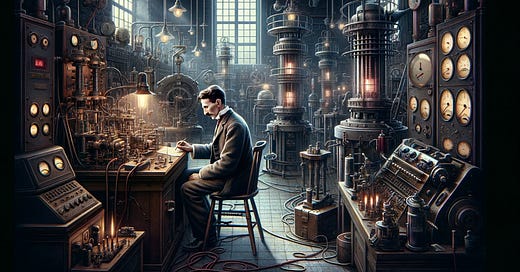Econ 115 :: The World Economy in the 20th Century :: Lecture 6 :: Post-1870 Technological Acceleration
The slides from the sixth lecture of my first post-big book excursion through the economic history of the 20th century; post-1870 technological acceleration…
The slides from the sixth lecture of my first post-big book excursion through the economic history of the 20th century; post-1870 technological acceleration…
2024-02-01 Th: Post-1870 Technological Acceleration
DeLong, J. Bradford. 2022. Slouching Towards Utopia: An Economic History of the Twentieth Century. New York: Basic Books <bit.ly/3pP3Krk> <https://bcourses.berkeley.edu/files/87705514/download?download_frd=1>, ch. 2.
Kuznets, Simon. 1971. Modern Economic Growth: Findings & Reflections. NobelPrize.org. Nobel Media AB. Lecture to the memory of Alfred Nobel, December 11, 1971. <https://www.nobelprize.org/prizes/economic-sciences/1971/kuznets/lecture/>.
Vries, Peter. 2010. "The California School and Beyond: How to Study the Great Divergence?" History Compass 8 (7): 730–751. <https://compass-onlinelibrary-wileycom.libproxy.berkeley.edu/doi/10.1111/j.1478-0542.2010.00698.x>.
Lecture Highlights:
Courtesy of Sub-Turing BradBot: The most important defining aspect of the economic history of the long 20th century was its pace of technological and industrial change: an unparalleled pace of technological advancement. Of secondary importance, and secondary only because of the magnitude of the technological acceleration, were the profound impacts of globalization and of the demographic transition. This era was thus a pivotal shift from all previous historical periods, with humanity's technological capabilities doubling with each generation for the first time ever, not just increasing productivity within existing structures butcreating new systems, job types, and societal frameworks.
It is important to register the reasons behind the accelerated pace of technological advancements post-1870:
Globalization powerfully incentivized research and development.
But it was the development and establishment of industrial research labs and modern corporations that appears to have been crucial.
These institutions rationalized and routinized—and thus revolutionized—the processes of discovery, development, deployment, and diffusion of the technologies that were the essential causes of modern economic growth; as opposed to previous eras in which all of these processes were infrequent, hit-or-miss, and not sustained.
These institutions only worked their magic because they themselves rested on twin foundations:
Modern science—not just professional and sustained community inquiry, and not jut inquiry into natural philosophy, but inquiry-by-experiment, with, as the motto of the Royal Society says, “nothing [accepted] by report” but only via replicable experimental demonstration.
The long line of institutional developments stretching back all the way to Gilgamesh, if not before






